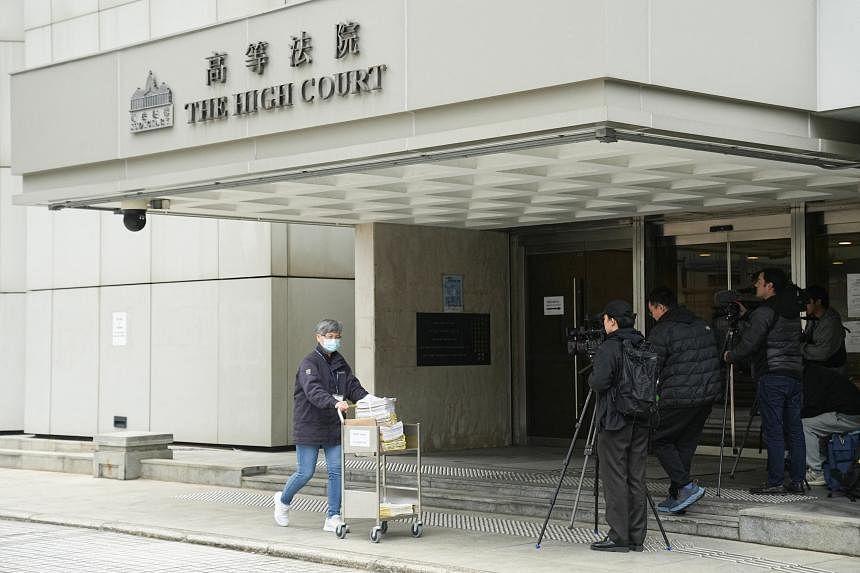HONG KONG - As Hong Kong faces fresh scrutiny of its media freedoms with a second security law in force, the head of a leading local press group says the city’s environment has been changing that could make it difficult to report the news objectively and critically.
“After Article 23, the change to the state of press freedom in Hong Kong is big, even if not immediately obvious. The atmosphere for news reporting is changing,” Hong Kong Journalists Association (HKJA) chairman Ronson Chan told The Straits Times, referring to the city’s domestic security law that took effect on March 23.
“We want to continue our duties in reporting the news objectively and critically for the Hong Kong community. We want to be brave. But courage comes with a price and the question is whether we can afford to pay this price,” said Mr Chan.
Trying to report some sensitive aspects of news events, for example, concerning the government’s security-related actions, “could now entail a bigger risk of crossing the authorities’ red lines into a national security offence”, he added.
Mr Chan’s comments come a week after a representative of an international non-governmental organisation (NGO) advocating for press freedom was deported upon arrival in Hong Kong.
Reporters Without Borders advocacy officer Aleksandra Bielakowska was on April 10 detained, searched and questioned for six hours at the Hong Kong airport and subsequently deported.
The authorities did not make clear the reasons for her deportation.
She had been slated to meet journalists in the city and attend hearings of the high-profile national security trial of long-time opposition supporter and media tycoon Jimmy Lai.
Foreign governments and monitoring groups both local and abroad have warned that the Article 23 national security law that was passed by the city’s legislature on March 19 would further curtail media freedoms in the city.
It complements the one imposed by Beijing on Hong Kong in June 2020 under which Lai is being tried.
The second law – required under Article 23 of the Basic Law, Hong Kong’s mini-Constitution – punishes offences such as treason, theft of state secrets and external interference with sentences spanning several years in jail to life imprisonment.
HKJA, which has been vocal in advocating for press freedom in Hong Kong, has in recent months raised issues with the new law as well as other developments restricting reporters’ operations.
The association has flagged concerns that the law’s definitions of “state secrets” and “foreign forces” are too broad and vague. This makes it hard for journalists to judge what constitutes a national security threat and could deter the press from reporting on matters of public interest, it said.
Now that the law has been enacted, “some media workers will be more inclined to want to carry purely positive Hong Kong reports, becoming much more cautious of any report critical of any government policy, sometimes to the point of self-censorship”, Mr Chan said.
A HKJA survey found that 90 per cent of the 105 journalists who responded believed that Article 23 would have a significant negative impact on media freedom in Hong Kong.
In April this year, HKJA sought to challenge the government’s “unreasonable” revised media rules that from 2024 required journalists to first obtain direct approval from the transport commissioner before gaining access to a public database of vehicle ownership records.
The change came after reporter Bao Choy’s 2023 landmark victory in a case in which she was initially convicted of making a false statement to access the vehicle registry for information for a documentary she was making on a mob attack during mass protests in 2019.
The top court quashed the conviction, saying the statement was made for the purpose of “genuine investigative journalism”.
Since the change kicked in in January, HKJA said, none of the eight journalist applications to access vehicle records had been successful.
The High Court ruled on April 17 to allow the association to mount a legal challenge to the new policy.
Professor Donald Low, a senior lecturer at the Hong Kong University of Science and Technology’s division of public policy, likened the erosion of media freedoms in the city to the slicing of a cured sausage.
“It is probably the case that media freedoms in Hong Kong have been eroded,” Prof Low told ST.
“The imposition of the national security law and Article 23 may not have immediately taken off a large chunk of that salami. Rather, these laws allow the authorities to slice away media freedoms as one would slice a salami – bit by bit.”
At the end of March, immediately following the enactment of Article 23, US-funded news agency Radio Free Asia (RFA) shut its Hong Kong bureau, citing concern for staff safety under the new law. It is the first foreign media outlet to announce its closure after the law kicked in.
“Actions by Hong Kong authorities, including referring to RFA as a ‘foreign force’, raise serious questions about our ability to operate in safety with the enactment of Article 23,” RFA said at the time.
In response, the government said it condemned all “scaremongering” in reference to the new law. “To single out Hong Kong and suggest that journalists would only experience concerns when operating here but not in other countries would be grossly biased, if not outrageous,” a spokesman said.
A month before its closure, RFA was slammed by security chief Chris Tang for “smearing” Article 23 when it criticised the legislation for targeting the media. In January, it was lambasted by the authorities after it interviewed exiled activist Ted Hui and carried his criticism of the Hong Kong police force in its report.
The government has lately also increasingly hit out at various Western media agencies, including the BBC and Wall Street Journal, over what it sees as their unfavourable coverage of Article 23 through press statements and op-eds.
Local media have not been spared either.
Chinese-language newspaper Ming Pao was in March censured for a “misleading” article and “malicious” headline suggesting that the new law would tighten media regulations and subject some offences to extradition to mainland China for trial. Ming Pao later issued an apology and clarification after Mr Tang pointed out that some of the content in its report was “false and incorrect”.
In July 2023, the Security Bureau headed by Mr Tang also condemned a “misleading” Ming Pao opinion piece penned by Democratic Party chairman Lo Kin-hei on Hong Kong officials’ attitudes towards mental health issues.
In May 2023, the paper axed a satirical current affairs comic strip Zunzi Comics by the political cartoonist Zunzi that had been running for 40 years, following repeated government complaints that it stoked public ill will. Books he published were taken off the shelves of the city’s public libraries.
English-language online news portal Hong Kong Free Press, meanwhile, has lamented the difficulties of reporting even “good Hong Kong stories”, documenting in a January report how officials repeatedly thwarted its efforts to cover positive features of the work that various government departments do.
Prof Low – who pens regular commentaries for English-language newspaper South China Morning Post – said he has personally never received any pressure to moderate his critiques of the government’s economic and social policies despite often writing about the authorities’ “passivity in reinventing the Hong Kong economy”, among other issues.
He acknowledged, however, that “while criticisms of most economic and social policies are still tolerated, one should tread very carefully when commenting on security or political issues, or on issues that the mainland Chinese authorities would consider taboo, Taiwanese independence, for example”.
The government says Hong Kong people enjoy freedom of the press and freedom of speech. But it has warned that these freedoms “may be subject to restrictions that are provided by law and are necessary for pursuing legitimate aims such as protection of national security or public order”.
Hong Kong has previously been held up as a bastion of media freedom in Asia. It fell 17 places to 46th spot in a global freedom ranking, the Human Freedom Index 2023, collated by Canadian think-tank Fraser Institute and US think-tank Cato Institute and released in December 2023.
It was the second-biggest drop among the 165 territories assessed. Myanmar, which declined the most, fell 20 spots to 162nd place. Singapore came in 44th in that ranking.


